(新课标)Unit 5 Section A 1a-1c 课件+内嵌音视频 (新目标七下Unit 5 Why do you like pandas?)
文档属性
| 名称 | (新课标)Unit 5 Section A 1a-1c 课件+内嵌音视频 (新目标七下Unit 5 Why do you like pandas?) |
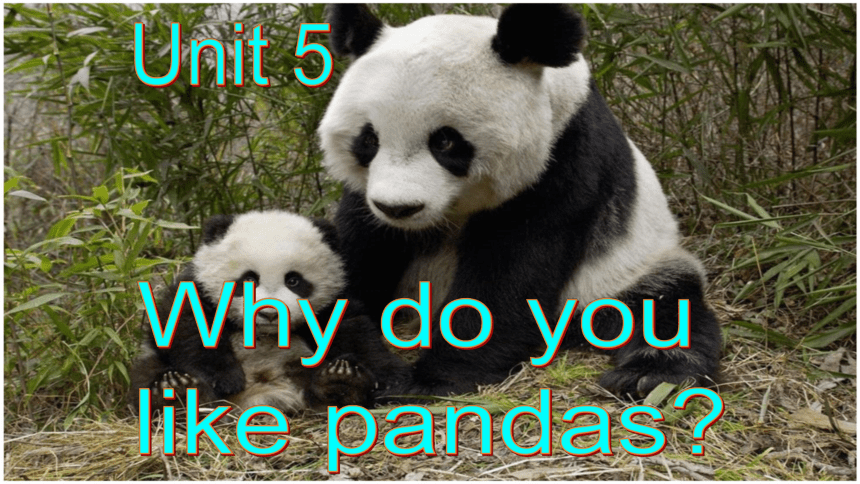
|
|
| 格式 | pptx | ||
| 文件大小 | 88.7MB | ||
| 资源类型 | 试卷 | ||
| 版本资源 | 人教新目标(Go for it)版 | ||
| 科目 | 英语 | ||
| 更新时间 | 2024-04-13 00:00:00 | ||
图片预览

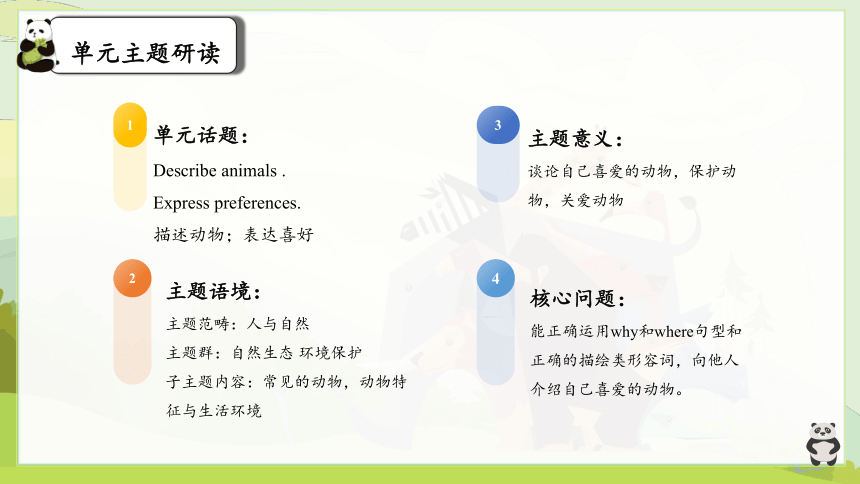
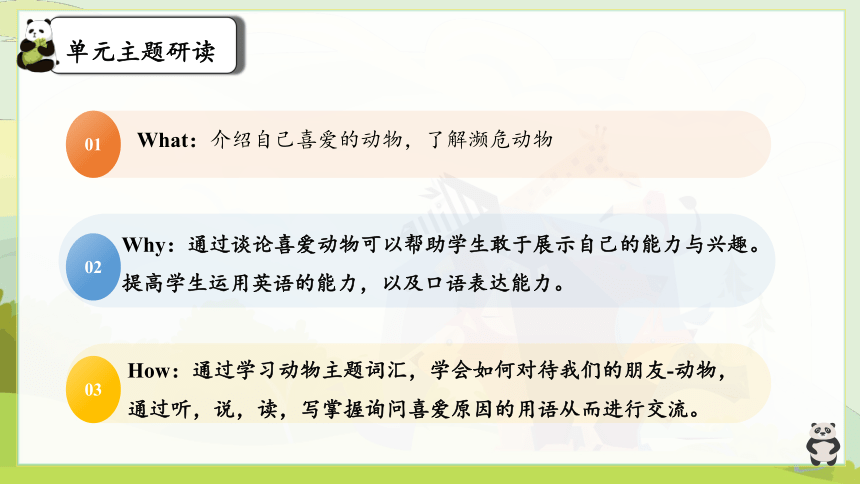
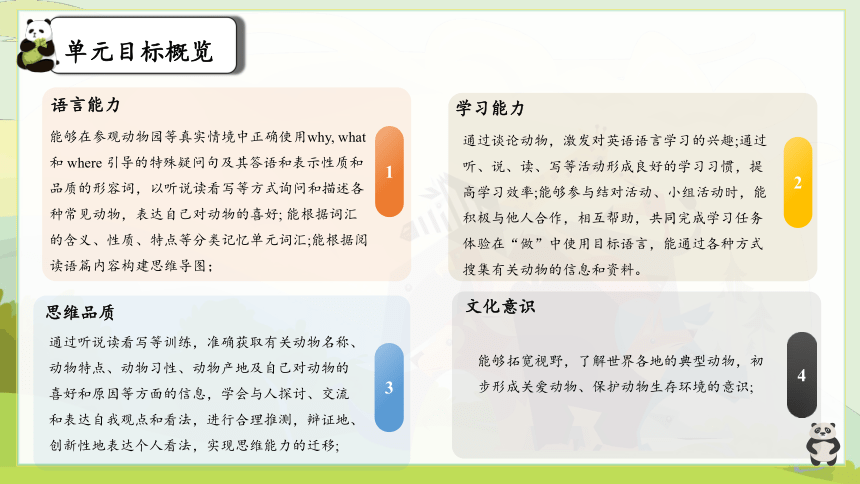
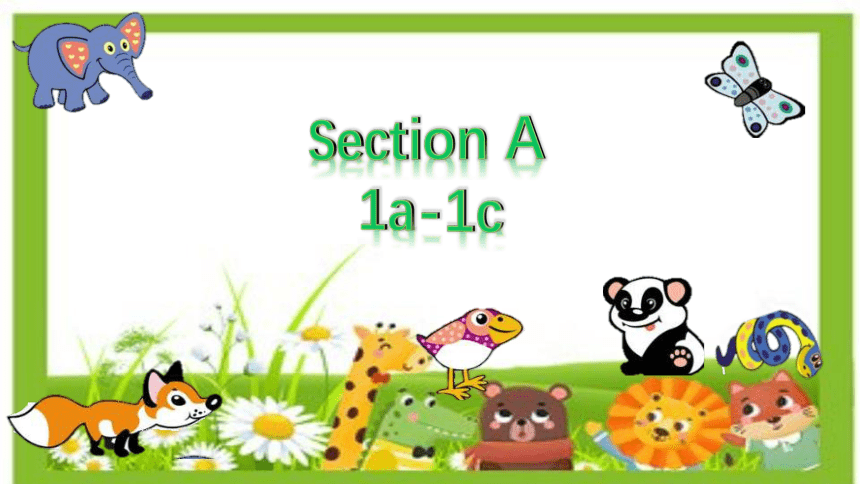
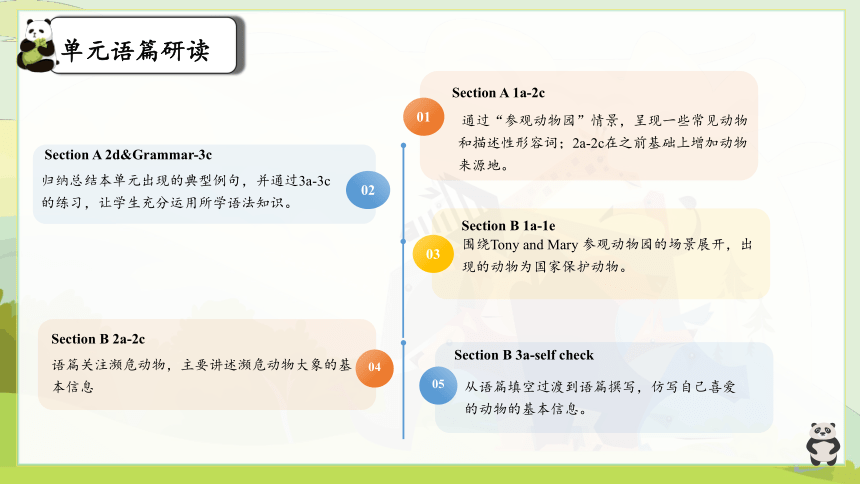
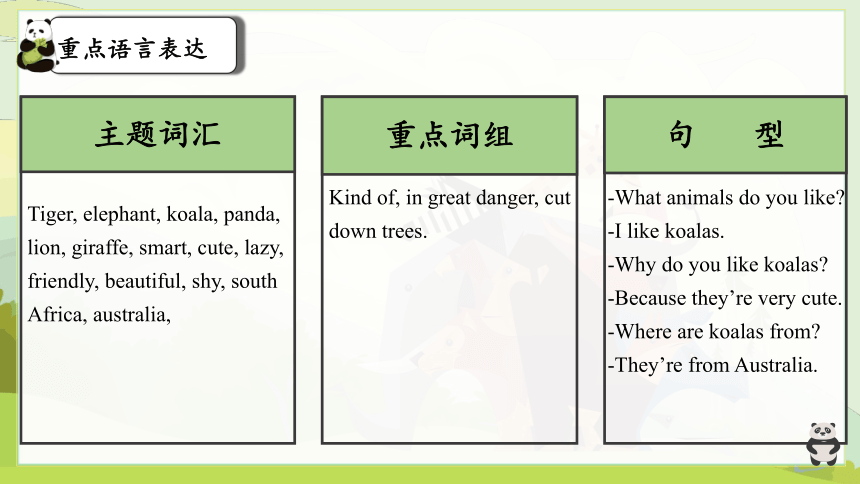
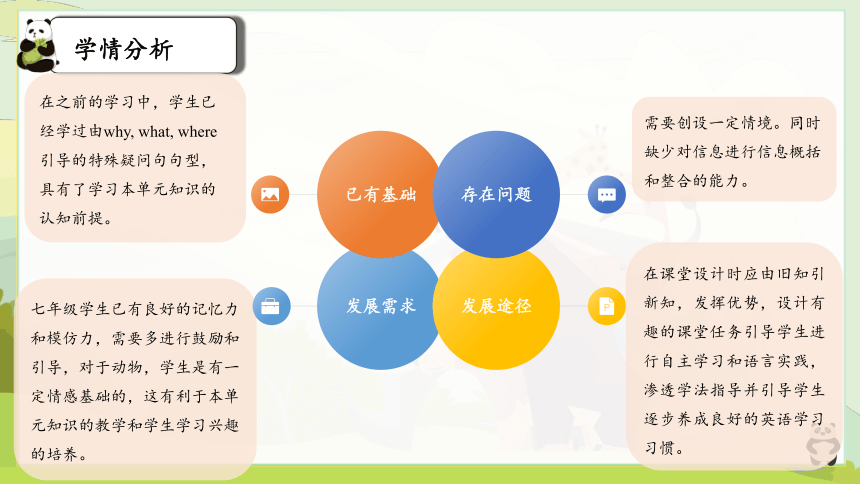
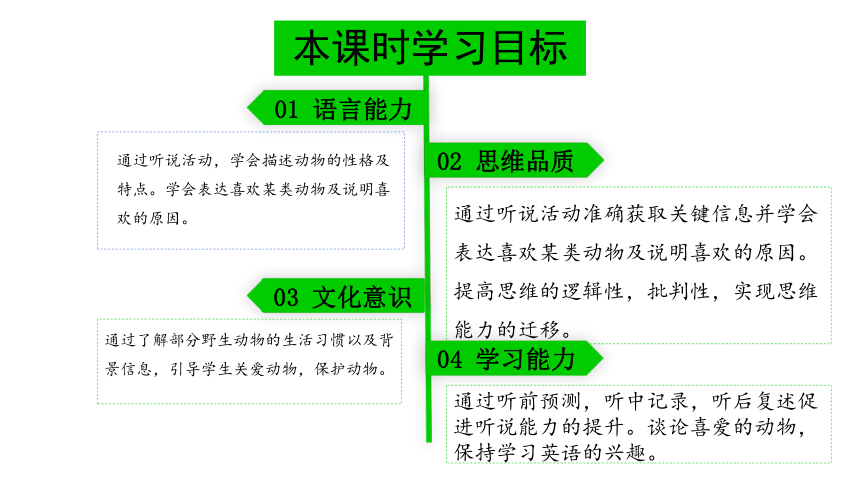

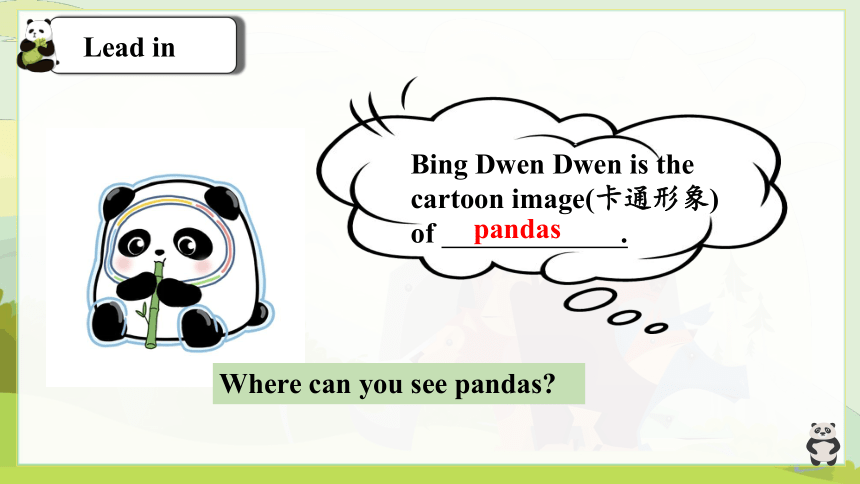
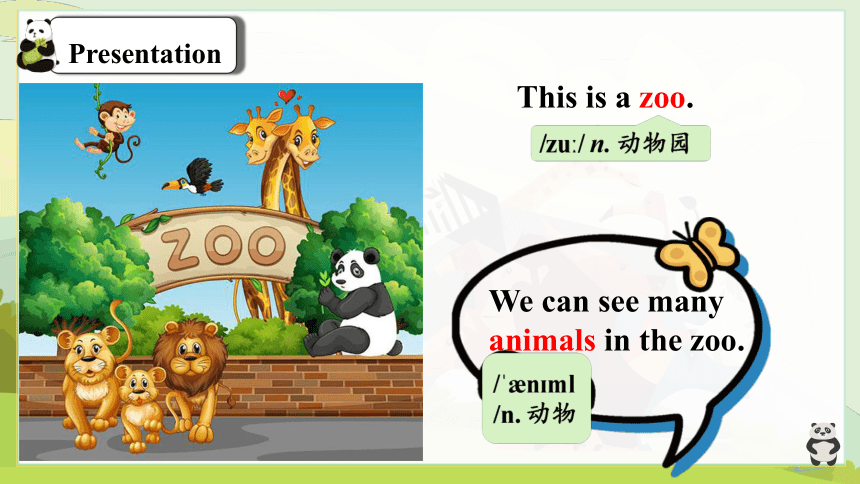
文档简介
(共32张PPT)
Why do you
like pandas
Unit 5
单元主题研读
2
4
核心问题:
能正确运用why和where句型和正确的描绘类形容词,向他人介绍自己喜爱的动物。
2
主题语境:
主题范畴:人与自然
主题群:自然生态 环境保护
子主题内容:常见的动物,动物特征与生活环境
1
单元话题:
Describe animals .
Express preferences.
描述动物;表达喜好
3
主题意义:
谈论自己喜爱的动物,保护动物,关爱动物
单元主题研读
01
What:介绍自己喜爱的动物,了解濒危动物
02
Why:通过谈论喜爱动物可以帮助学生敢于展示自己的能力与兴趣。提高学生运用英语的能力,以及口语表达能力。
03
How:通过学习动物主题词汇,学会如何对待我们的朋友-动物,通过听,说,读,写掌握询问喜爱原因的用语从而进行交流。
单元目标概览
语言能力
能够在参观动物园等真实情境中正确使用why, what和 where 引导的特殊疑问句及其答语和表示性质和品质的形容词,以听说读看写等方式询问和描述各种常见动物,表达自己对动物的喜好; 能根据词汇的含义、性质、特点等分类记忆单元词汇;能根据阅读语篇内容构建思维导图;
1
思维品质
通过听说读看写等训练,准确获取有关动物名称、动物特点、动物习性、动物产地及自己对动物的喜好和原因等方面的信息,学会与人探讨、交流和表达自我观点和看法,进行合理推测,辩证地、创新性地表达个人看法,实现思维能力的迁移;
3
学习能力
通过谈论动物,激发对英语语言学习的兴趣;通过听、说、读、写等活动形成良好的学习习惯,提高学习效率;能够参与结对活动、小组活动时,能积极与他人合作,相互帮助,共同完成学习任务体验在“做”中使用目标语言,能通过各种方式搜集有关动物的信息和资料。
2
文化意识
能够拓宽视野,了解世界各地的典型动物,初步形成关爱动物、保护动物生存环境的意识;
4
Section A
1a-1c
Section B 1a-1e
围绕Tony and Mary 参观动物园的场景展开,出现的动物为国家保护动物。
03
Section A 2d&Grammar-3c
归纳总结本单元出现的典型例句,并通过3a-3c的练习,让学生充分运用所学语法知识。
02
Section A 1a-2c
01
通过“参观动物园”情景,呈现一些常见动物和描述性形容词;2a-2c在之前基础上增加动物来源地。
05
语篇关注濒危动物,主要讲述濒危动物大象的基本信息
04
Section B 2a-2c
Section B 3a-self check
从语篇填空过渡到语篇撰写,仿写自己喜爱的动物的基本信息。
单元语篇研读
主题词汇
重点词组
句 型
Tiger, elephant, koala, panda, lion, giraffe, smart, cute, lazy, friendly, beautiful, shy, south Africa, australia,
Kind of, in great danger, cut down trees.
-What animals do you like
-I like koalas.
-Why do you like koalas
-Because they’re very cute.
-Where are koalas from
-They’re from Australia.
重点语言表达
学情分析
七年级学生已有良好的记忆力和模仿力,需要多进行鼓励和引导,对于动物,学生是有一定情感基础的,这有利于本单元知识的教学和学生学习兴趣的培养。
发展需求
发展途径
已有基础
存在问题
需要创设一定情境。同时缺少对信息进行信息概括和整合的能力。
在课堂设计时应由旧知引新知,发挥优势,设计有趣的课堂任务引导学生进行自主学习和语言实践,渗透学法指导并引导学生逐步养成良好的英语学习习惯。
在之前的学习中,学生已经学过由why, what, where 引导的特殊疑问句句型,具有了学习本单元知识的认知前提。
本课时学习目标
01 语言能力
02 思维品质
03 文化意识
04 学习能力
通过听说活动准确获取关键信息并学会表达喜欢某类动物及说明喜欢的原因。提高思维的逻辑性,批判性,实现思维能力的迁移。
通过了解部分野生动物的生活习惯以及背景信息,引导学生关爱动物,保护动物。
通过听前预测,听中记录,听后复述促进听说能力的提升。谈论喜爱的动物,保持学习英语的兴趣。
通过听说活动,学会描述动物的性格及特点。学会表达喜欢某类动物及说明喜欢的原因。
Lead in
What animal does the video talk about
Lead in
Bing Dwen Dwen is the cartoon image(卡通形象) of .
pandas
Where can you see pandas
This is a zoo.
/zu / n. 动物园
We can see many animals in the zoo.
/ n ml/n. 动物
Presentation
lion
elephant
tiger
giraffe
panda
cat
koala
No, I’m a pet.
We’re all animals.
a
b
c
d
e
f
1. tiger __
2. elephant __
3. koala __
4. panda __
5. lion __
6. giraffe __
d
f
e
c
a
b
Match the words with the animals in the picture.
1a
大型宣传广告牌,采用全大写的形式。
Listen and check (√) the animals you hear in 1a.
a
b
c
d
e
f
√
√
√
1b
/be (r)/
bear
Conversation 1
Girl: Let’s see the first. They’re my .
Boy: Why
Girl: Because they’re very .
Listen again and fill in the blanks.
pandas
favorite animals
cute
Conversation 2
Boy: Let’s see the .
Girl: Why do you want to see them
Boy: Because they’re .
Listen again and fill in the blanks.
giraffes
beautiful
Listen again and fill in the blanks.
Conversation 3
Girl: Let’s see the now. I like koalas.
Boy: Why
Girl: Because they’re .
koalas
interesting
Practice the conversation with your partner. Then make conversations about the other animals in 1a. Use the words in the box.
cute interesting
fun smart
lazy beautiful
1c
Let’s see the lions.
Why do you want to see them
Because they’re interesting.
cute, beautiful, smart, friendly, strong…
Lazy, scary, dangerous…
/kju t/ adj. 可爱的;机灵的
What animal do you like best And why do you like them
I like… because they are…
Pair work
Let’s learn more about pandas.
Where are pandas from
Pandas are from China.
Post-listening
There are so many beautiful and lovely animals in the world. Treat them as our friends!
Point 1
Let’s see the pandas first.我们先看熊猫吧
Language points
该结构意为“我们做……吧”,常用于向对方提出意见或建议。Let’s后接动词原形,其否定形式是在动词原形前加not,构成Let’s not do sth.
Let’s go swimming.
Let’s not tell anyone about this.
Let’s do sth.
Point 2
—Why do you want to see them 你为什么想看它们?
—Because they’re interesting. 因为它们有趣。
Language points
【句式剖析】此处是why引导的特殊疑问句及其回答。why意为“为什么”,用来询问原因,多用because引导的句子来回答。
because的用法
because 在此处作连词,意为“因为”,后接句子,表示原因,常用来回答why引导的特殊疑问句。
一. 单选
1.My cousin and I often walk to the to see pandas on weekends.
A. bank B. zoo C. market
2.—Where is he ______
—South Africa.
A. for B. from C. like
3.—______did you stop playing
—Because I was tired.
How B. Why C. When D. Where
B
B
B
4.My sister is ______ cute. I like her very much.
A. kind B. a kind C. kind of D. a kind of
5.Tom doesn’t like tigers because they are ______.
A. interesting B. cute C. beautiful D. scary
C
D
1. —John is very l .
—Yes. Every morning he gets up late.
2. —Let’s go to the z to see that koala.
—That sounds good.
lazy
zoo
3. —Hey, Mrs. Hand. Your daughter is very b .
—Thank you. Your daughter is nice, too.
4. Kate is a s girl so this math problem is easy for her.
5. My favorite a are monkeys.
beautiful
smart
animals
二、根据语境及所给首字母提示, 补全所缺单词。
一. 单选
1.My cousin and I often walk to the to see pandas on weekends.
A. bank B. zoo C. market
2.—Where is he ______
—South Africa.
A. for B. from C. like
3.—______did you stop playing
—Because I was tired.
How B. Why C. When D. Where
B
B
B
4.My sister is ______ cute. I like her very much.
A. kind B. a kind C. kind of D. a kind of
5.Tom doesn’t like tigers because they are ______.
A. interesting B. cute C. beautiful D. scary
C
D
1. —John is very l .
—Yes. Every morning he gets up late.
2. —Let’s go to the z to see that koala.
—That sounds good.
lazy
zoo
3. —Hey, Mrs. Hand. Your daughter is very b .
—Thank you. Your daughter is nice, too.
4. Kate is a s girl so this math problem is easy for her.
5. My favorite a are monkeys.
beautiful
smart
animals
二、根据语境及所给首字母提示, 补全所缺单词。
Homework
1. Learn the new words by heart and write about your favorite animals.
2. Preview the new words and expressions.
Summary
①—Why do you like them (pandas)
—Because they’re kind of interesting.
②—Where are they (pandas) from
—They’re from China.
Sentences
kind of, South Africa
Useful expressions
panda, zoo, tiger, elephant, koala, lion, giraffe, animal, cute, lazy, smart, beautiful, scary, kind, Australia, south, Africa
Key words
Homework
Remember all the new words that we learned.
Finish the exercises. (A)
2. List more animals that you know. (B)
3. Describe your favorite animals. Ask your parents what they think of them. (C)
Thank you !
Why do you
like pandas
Unit 5
单元主题研读
2
4
核心问题:
能正确运用why和where句型和正确的描绘类形容词,向他人介绍自己喜爱的动物。
2
主题语境:
主题范畴:人与自然
主题群:自然生态 环境保护
子主题内容:常见的动物,动物特征与生活环境
1
单元话题:
Describe animals .
Express preferences.
描述动物;表达喜好
3
主题意义:
谈论自己喜爱的动物,保护动物,关爱动物
单元主题研读
01
What:介绍自己喜爱的动物,了解濒危动物
02
Why:通过谈论喜爱动物可以帮助学生敢于展示自己的能力与兴趣。提高学生运用英语的能力,以及口语表达能力。
03
How:通过学习动物主题词汇,学会如何对待我们的朋友-动物,通过听,说,读,写掌握询问喜爱原因的用语从而进行交流。
单元目标概览
语言能力
能够在参观动物园等真实情境中正确使用why, what和 where 引导的特殊疑问句及其答语和表示性质和品质的形容词,以听说读看写等方式询问和描述各种常见动物,表达自己对动物的喜好; 能根据词汇的含义、性质、特点等分类记忆单元词汇;能根据阅读语篇内容构建思维导图;
1
思维品质
通过听说读看写等训练,准确获取有关动物名称、动物特点、动物习性、动物产地及自己对动物的喜好和原因等方面的信息,学会与人探讨、交流和表达自我观点和看法,进行合理推测,辩证地、创新性地表达个人看法,实现思维能力的迁移;
3
学习能力
通过谈论动物,激发对英语语言学习的兴趣;通过听、说、读、写等活动形成良好的学习习惯,提高学习效率;能够参与结对活动、小组活动时,能积极与他人合作,相互帮助,共同完成学习任务体验在“做”中使用目标语言,能通过各种方式搜集有关动物的信息和资料。
2
文化意识
能够拓宽视野,了解世界各地的典型动物,初步形成关爱动物、保护动物生存环境的意识;
4
Section A
1a-1c
Section B 1a-1e
围绕Tony and Mary 参观动物园的场景展开,出现的动物为国家保护动物。
03
Section A 2d&Grammar-3c
归纳总结本单元出现的典型例句,并通过3a-3c的练习,让学生充分运用所学语法知识。
02
Section A 1a-2c
01
通过“参观动物园”情景,呈现一些常见动物和描述性形容词;2a-2c在之前基础上增加动物来源地。
05
语篇关注濒危动物,主要讲述濒危动物大象的基本信息
04
Section B 2a-2c
Section B 3a-self check
从语篇填空过渡到语篇撰写,仿写自己喜爱的动物的基本信息。
单元语篇研读
主题词汇
重点词组
句 型
Tiger, elephant, koala, panda, lion, giraffe, smart, cute, lazy, friendly, beautiful, shy, south Africa, australia,
Kind of, in great danger, cut down trees.
-What animals do you like
-I like koalas.
-Why do you like koalas
-Because they’re very cute.
-Where are koalas from
-They’re from Australia.
重点语言表达
学情分析
七年级学生已有良好的记忆力和模仿力,需要多进行鼓励和引导,对于动物,学生是有一定情感基础的,这有利于本单元知识的教学和学生学习兴趣的培养。
发展需求
发展途径
已有基础
存在问题
需要创设一定情境。同时缺少对信息进行信息概括和整合的能力。
在课堂设计时应由旧知引新知,发挥优势,设计有趣的课堂任务引导学生进行自主学习和语言实践,渗透学法指导并引导学生逐步养成良好的英语学习习惯。
在之前的学习中,学生已经学过由why, what, where 引导的特殊疑问句句型,具有了学习本单元知识的认知前提。
本课时学习目标
01 语言能力
02 思维品质
03 文化意识
04 学习能力
通过听说活动准确获取关键信息并学会表达喜欢某类动物及说明喜欢的原因。提高思维的逻辑性,批判性,实现思维能力的迁移。
通过了解部分野生动物的生活习惯以及背景信息,引导学生关爱动物,保护动物。
通过听前预测,听中记录,听后复述促进听说能力的提升。谈论喜爱的动物,保持学习英语的兴趣。
通过听说活动,学会描述动物的性格及特点。学会表达喜欢某类动物及说明喜欢的原因。
Lead in
What animal does the video talk about
Lead in
Bing Dwen Dwen is the cartoon image(卡通形象) of .
pandas
Where can you see pandas
This is a zoo.
/zu / n. 动物园
We can see many animals in the zoo.
/ n ml/n. 动物
Presentation
lion
elephant
tiger
giraffe
panda
cat
koala
No, I’m a pet.
We’re all animals.
a
b
c
d
e
f
1. tiger __
2. elephant __
3. koala __
4. panda __
5. lion __
6. giraffe __
d
f
e
c
a
b
Match the words with the animals in the picture.
1a
大型宣传广告牌,采用全大写的形式。
Listen and check (√) the animals you hear in 1a.
a
b
c
d
e
f
√
√
√
1b
/be (r)/
bear
Conversation 1
Girl: Let’s see the first. They’re my .
Boy: Why
Girl: Because they’re very .
Listen again and fill in the blanks.
pandas
favorite animals
cute
Conversation 2
Boy: Let’s see the .
Girl: Why do you want to see them
Boy: Because they’re .
Listen again and fill in the blanks.
giraffes
beautiful
Listen again and fill in the blanks.
Conversation 3
Girl: Let’s see the now. I like koalas.
Boy: Why
Girl: Because they’re .
koalas
interesting
Practice the conversation with your partner. Then make conversations about the other animals in 1a. Use the words in the box.
cute interesting
fun smart
lazy beautiful
1c
Let’s see the lions.
Why do you want to see them
Because they’re interesting.
cute, beautiful, smart, friendly, strong…
Lazy, scary, dangerous…
/kju t/ adj. 可爱的;机灵的
What animal do you like best And why do you like them
I like… because they are…
Pair work
Let’s learn more about pandas.
Where are pandas from
Pandas are from China.
Post-listening
There are so many beautiful and lovely animals in the world. Treat them as our friends!
Point 1
Let’s see the pandas first.我们先看熊猫吧
Language points
该结构意为“我们做……吧”,常用于向对方提出意见或建议。Let’s后接动词原形,其否定形式是在动词原形前加not,构成Let’s not do sth.
Let’s go swimming.
Let’s not tell anyone about this.
Let’s do sth.
Point 2
—Why do you want to see them 你为什么想看它们?
—Because they’re interesting. 因为它们有趣。
Language points
【句式剖析】此处是why引导的特殊疑问句及其回答。why意为“为什么”,用来询问原因,多用because引导的句子来回答。
because的用法
because 在此处作连词,意为“因为”,后接句子,表示原因,常用来回答why引导的特殊疑问句。
一. 单选
1.My cousin and I often walk to the to see pandas on weekends.
A. bank B. zoo C. market
2.—Where is he ______
—South Africa.
A. for B. from C. like
3.—______did you stop playing
—Because I was tired.
How B. Why C. When D. Where
B
B
B
4.My sister is ______ cute. I like her very much.
A. kind B. a kind C. kind of D. a kind of
5.Tom doesn’t like tigers because they are ______.
A. interesting B. cute C. beautiful D. scary
C
D
1. —John is very l .
—Yes. Every morning he gets up late.
2. —Let’s go to the z to see that koala.
—That sounds good.
lazy
zoo
3. —Hey, Mrs. Hand. Your daughter is very b .
—Thank you. Your daughter is nice, too.
4. Kate is a s girl so this math problem is easy for her.
5. My favorite a are monkeys.
beautiful
smart
animals
二、根据语境及所给首字母提示, 补全所缺单词。
一. 单选
1.My cousin and I often walk to the to see pandas on weekends.
A. bank B. zoo C. market
2.—Where is he ______
—South Africa.
A. for B. from C. like
3.—______did you stop playing
—Because I was tired.
How B. Why C. When D. Where
B
B
B
4.My sister is ______ cute. I like her very much.
A. kind B. a kind C. kind of D. a kind of
5.Tom doesn’t like tigers because they are ______.
A. interesting B. cute C. beautiful D. scary
C
D
1. —John is very l .
—Yes. Every morning he gets up late.
2. —Let’s go to the z to see that koala.
—That sounds good.
lazy
zoo
3. —Hey, Mrs. Hand. Your daughter is very b .
—Thank you. Your daughter is nice, too.
4. Kate is a s girl so this math problem is easy for her.
5. My favorite a are monkeys.
beautiful
smart
animals
二、根据语境及所给首字母提示, 补全所缺单词。
Homework
1. Learn the new words by heart and write about your favorite animals.
2. Preview the new words and expressions.
Summary
①—Why do you like them (pandas)
—Because they’re kind of interesting.
②—Where are they (pandas) from
—They’re from China.
Sentences
kind of, South Africa
Useful expressions
panda, zoo, tiger, elephant, koala, lion, giraffe, animal, cute, lazy, smart, beautiful, scary, kind, Australia, south, Africa
Key words
Homework
Remember all the new words that we learned.
Finish the exercises. (A)
2. List more animals that you know. (B)
3. Describe your favorite animals. Ask your parents what they think of them. (C)
Thank you !
同课章节目录
- Unit 1 Can you play the guitar?
- Section A
- Section B
- Unit 2 What time do you go to school?
- Section A
- Section B
- Unit 3 How do you get to school?
- Section A
- Section B
- Unit 4 Don't eat in class.
- Section A
- Section B
- Unit 5 Why do you like pandas?
- Section A
- Section B
- Unit 6 I'm watching TV.
- Section A
- Section B
- Review of Units 1-6
- Unit 7 It's raining!
- Section A
- Section B
- Unit 8 Is there a post office near here?
- Section A
- Section B
- Unit 9 What does he look like?
- Section A
- Section B
- Unit 10 I'd like some noodles.
- Section A
- Section B
- Unit 11 How was your school trip?
- Section A
- Section B
- Unit 12 What did you do last weekend?
- Section A
- Section B
